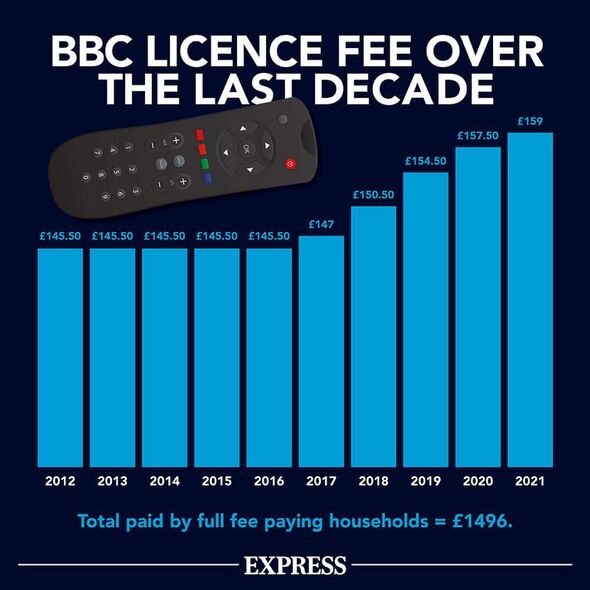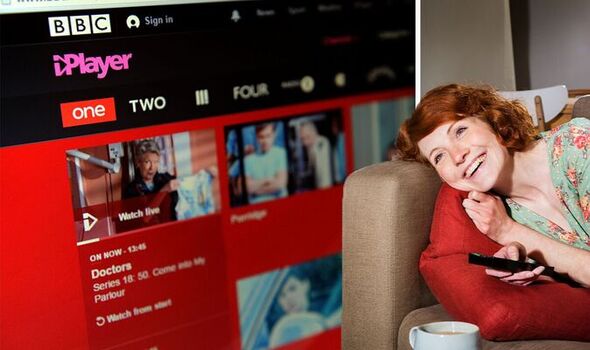David Dimbleby says that TV licence system is ‘very unfair’
Amid soaring living costs, Britons are being urged to check when and where they may be able to make savings and claim additional support.
An area many often forget about is the TV licence, but correctly claiming a discount could lift a noticeable weight off of a household’s monthly or annual outgoings.
A TV licence is a tax to fund public broadcasting and by law, any household in the UK that watches live TV must own one.
READ MORE: Britons may be able to cancel TV licence and get £159 refund – check eligibility
How much is the TV licence fee?

A TV licence currently costs households £159 a year (Image: EXPRESS)
Currently, the fee for a TV licence costs £159 a year, while for those with black and white TVs it costs £53.50 a year.
The licence fee price has been frozen until 2024 due to the cost of living crisis, meaning households will not see any change to the licence fee until April 1, 2024.
But the figure has been rising steadily over the past few years, costing £14 less at £145.50 in 2016. In 2000, the price was a little over £100.
The fee has come under criticism for several years, not least because it is a flat-rate payment, which means the poorest households are paying as much as the richest.
The current licence fee model will remain in place until December 2027 but the Government has not announced if the fee will be scrapped and if so, what could replace it.
Who is entitled to a TV licence discount?

A TV licence currently costs households £159 a year (Image: GETTY/PA)
- Advert-free experience without interruptions.
- Rocket-fast speedy loading pages.
- Exclusive & Unlimited access to all our content.
For many, renewing the TV licence is commonplace, however, there are certain conditions that could mean someone is eligible for a reduced fee.
People who are blind (severely sight impaired), or live with someone who is blind, could be entitled to a blind concession TV licence. This would reduce the annual fee from £159 to £79.50 for a colour TV licence and £26.75 for a black and white TV licence.
The Royal National Institute of Blind People charity records that there are currently 340,000 people registered as blind in the UK, making it crucial to ensure that such a large group are aware of the significant discount available.
In order to snap up the concession licence, people must provide at least one of the following documents to confirm they are certified as blind:
- A CVI (Certificate of Visual Impairment)
- A BD8 Certificate
- A certificate or document issued by a Local Authority that shows they are registered as blind (severely sight impaired)
- A copy of a certificate from an Ophthalmologist (eye surgeon), stating that they are blind (severely sight impaired).
Once provided, they won’t need to provide this information again when they renew their TV Licence.
For those who live with someone who is blind and already has a TV licence, they’ll have to transfer the licence into the name of the person who is blind, in order to claim.
According to the website, people can do this by making a first-time blind application by entering the existing TV Licence number for the address into the form. Those who are partially sight impaired will not qualify for the 50 percent blind concession.
Who is entitled to a free TV licence?
People can get a free TV Licence if they, as the licence holder, are 75 years or older and they, or their partner living at the same address, receive Pension Credit.
Pension Credit is a benefit that tops up the state pension for people on a low income, however, it currently has the lowest take-up of all income-related benefits, according to the charity Independent Age.
So, it could be a good time for people to check if they’re eligible for this, as it can also help people claim housing benefit, heating bills, council tax, NHS dental care, and more.
People who are 75 or over and live in a residential care home may be covered by an ARC (Accommodation for Residential Care) TV Licence and also won’t have to pay for a licence – even if they don’t receive Pension Credit. TV Licencing advises people to speak to their care home administrator to find out.
When do people need a TV licence?
Households must purchase a TV licence if they want to watch or record TV programmes live as they’re being broadcast. This includes all programmes on any channel, and the same rules apply to those who watch live TV from a laptop, PC, tablet, or phone.
A licence is also needed if members of a household download or watch programmes broadcast on BBC iPlayer – live, catch up, or on demand.
The licence also covers online TV services such as ITV Hub, All 4, Amazon Prime Video, Now TV or Sky Go. However, unlike with BBC iPlayer, it’s not needed if a person only ever watches on-demand programmes on these TV services.
So, if people find themselves only watching catch-up TV (not including BBC iPlayer), they won’t need a TV licence – as long as they’re not using the TV services to watch anything live.
Households also don’t need a TV licence to watch streaming services like Netflix or Disney+. But it’s vital to be sure everyone in the same household follows the rules, otherwise, they could be hit with a £1,000 fine, while those in Guernsey and Jersey could face fines of up to £2000 and £500, respectively.
How to get a refund on your TV licence fee?
Instances when you may need a refund include not watching or recording live TV on any channel or device, moving to an address that already has a TV Licence or a person moving into a care home.
You can apply for a refund up to 14 days before the date you no longer need the TV Licence. If your licence has already expired, you can apply if less than two years have passed since the expiry date.
Refunds will be issued within 21 days of receiving your application and will be paid by either a cheque or by BACS transfer directly into your bank account.



